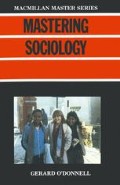Abstract
Defining ‘a family’ is not so simple as most people might immediately assume; there are many forms of family. In British society a basic family usually consists of a man and woman who have a steady relationship with each other and who also have children; children are essential to the idea of ‘family’, but they need not necessarily be ‘consanguine’—that is, related by blood to the adults with whom they live—although they usually are. A simple group of this kind is called a ‘nuclear’ family. Nearly all ‘nuclear’ families are related to one or more other nuclear families through parent-child relationships; mother will often have parents and brothers and sisters living and so will father. This family is called the ‘extended family’ and can include all known relations.
Preview
Unable to display preview. Download preview PDF.
Editor information
Copyright information
© 1985 Gerard O’Donnell
About this chapter
Cite this chapter
O’Donnell, G. (1985). Development and Characteristics of the Modern Family. In: O’Donnell, G. (eds) Mastering Sociology. Macmillan Master Series. Palgrave, London. https://doi.org/10.1007/978-1-349-17914-5_3
Download citation
DOI: https://doi.org/10.1007/978-1-349-17914-5_3
Publisher Name: Palgrave, London
Print ISBN: 978-0-333-38731-3
Online ISBN: 978-1-349-17914-5
eBook Packages: Palgrave Social & Cultural Studies CollectionSocial Sciences (R0)

